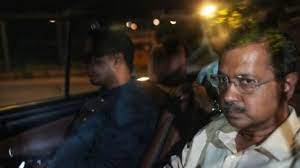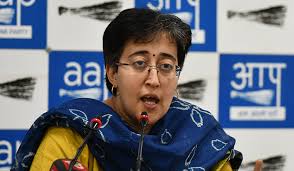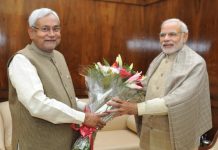The arrest of Delhi CM Arvind Kejriwal, who led AAP’s rapid ascent over the last decade, has clouded the party’s future with uncertainty. The challenge for the party now lies in finding a worthy leader capable of managing both the party and the government in Delhi. A report by Aayush Goel

When Delhi Chief Minister Arvind Kejriwal was arrested on March 21 on corruption charges, it came as no surprise to the majority of people. This pre-Lok Sabha election drama had been long predicted and anticipated by almost the entire nation, as well as the Aam Aadmi Party itself.
The party had in fact in November 2023 run a door-to-door campaign, asking residents of Delhi whether the CM should resign or run his government from jail. The Enforcement Directorate arrested Arvind Kejriwal after his name was mentioned multiple times in the chargesheets related to the excise policy case. The AAP national convenor is accused of soliciting kickbacks from liquor traders in exchange for favours.
The ED has also accused him of being the “kingpin and key conspirator” in the now-scrapped policy. The agency has already arrested at least 14 leaders including top three: Manish Sisodia and Sanjay Singh and now Kejriwal. The agency is not stopping at that as the federal agency has approached the court seeking permission to investigate AAP, the party Kejriwal is heading, as a beneficiary of the “proceeds of crime”.
Despite the arrest, which has triggered protest by party supporters and leaders across the country, Kejriwal remains undeterred while strongly denying the charges and accusing the BJP-led Centre of “manipulating investigative agencies for political motives”. The other opposition parties, part of the I.N.D.I.A block, call it BJP’s signature move to divert attention from its shortcomings, electoral bonds scam, this time. The Delhi CM is running his government from jail even as the Lieutenant Governor Vinai Kumar Saxena has strongly objected to the same, raising speculations of President’s rule in the national capital. Kejriwal has also moved the High Court against the arrest and the petition has been deferred for hearing to April 3.
What next?
Amidst the ongoing drama and constant allegations and counter allegations between the two parties, the episode has raised the biggest question: what next?. One of the foremost issues of discussion and decision is constitutional conduct with a sitting CM attempting to function from prison. Delhi LG V K Saxena has said, “I can assure the people of Delhi that the government will not be run from jail.” Until now, Kejriwal has shown no signs of relenting on his stand. His party is conveying at every point that the CM is issuing instructions from inside prison. This, by majority, is being seen as symbolic defiance by not quitting, especially when elections are, for all purposes, underway.
The scenario raises the prospect of suspension of the Delhi government under Article 239 AB. Unlike Article 356, which is the emergency provision for all states, there is no provision in Article 239 AB to obtain parliamentary approval within a stipulated time frame. So, if the Delhi assembly were to be suspended, there is no time limit on how long it could last. The powers would then rest with the Centre through LG. The timing of this, if executed, will be a political decision.
Meanwhile, in addition to the constitutional questions, AAP has been pushed into an existential crisis. The youngest national party, which registered a meteoric rise in the last 10 years under Kejriwal, is concerned about its future. Amidst the risk of losing power, if LG moves to invoke Article 239 AB, the party will be pushed into a ‘forced succession’ in what’s till now a one-man party. Third and the most relevant question is the role of the election umpire: the Election Commission of India.
Kejriwal’s arrest just after announcement of the polls has visibly tilted the level playing field in favour of the incumbent BJP. The World has its eyes set on the biggest democracy and maintaining legitimacy of electoral outcome is a herculean task now. So far, the arrest has invited comments from the US and Germany on following ‘fair and timely’ legal processes. India has strongly protested against both countries, summoning their senior diplomats to register its objection.
A day after India summoned a US diplomat and objected to remarks on Delhi Chief Minister Arvind Kejriwal’s arrest, the United States reiterated its call for “fair, transparent, timely legal processes”. US State Department spokesperson Matthew Miller also said that it was aware of the Congress party’s allegations that tax authorities had frozen some of their bank accounts. “We continue to follow these actions closely, including the arrest of Arvind Kejriwal. We encourage fair, transparent and timely legal processes for each of these issues,” Miller said.

The succession issue
Kejriwal’s arrest in the alleged excise policy scam has sparked a leadership crisis in the AAP as well as the Delhi government, with his wife Sunita Kejriwal and cabinet ministers Atishi and Saurabh Bharadwaj being talked about as a possible replacement. Sunita has taken upon herself to present her husband’s case to the media while Atishi is a young cabinet minister who holds the most number of portfolios in the Delhi government. Considered a close aide of Kejriwal and party’s spokesperson, she is being seen as the party’s face in its fight against ‘political vendetta’ by BJP.
Saurabh Bharadwaj, too, is a prominent member of the Delhi cabinet with several important portfolios, including health and urban development. Some quarters even are busy projecting Punjab CM Bhagwant Mann as man of the hour though he is also speculated to be the next ED target. Kejriwal’s arrest, contrasting his anti-corruption campaign that took India by storm in 2011, comes less than a month before India’s general elections kicks off on April 19. The AAP, of which he is the national convener, is part of the 27-party INDIA alliance aiming to challenge the governing BJP. In just over a decade, AAP, despite being a newcomer, has emerged as a formidable force. It has secured successive victories in Delhi’s state elections since 2013 and expanded its influence by winning crucial assembly polls in Punjab, where discontent against federal government policies prevailed.
All this has been credited to the AAP’s national convener Arvind Kejriwal, and the challenge before the party now is to come up with a worthy leader who can handle both the party and its government in Delhi and is at least close to Kejriwal’s stature. The urgency of the task becomes even more pressing as the AAP is gearing up to contest the Lok Sabha polls in Punjab, Delhi, Gujarat, Assam, and Haryana where Kejriwal was to be a key campaigner of the party.
‘It’s BJP vs People now’
Describing the arrest as a political vendetta, AAP expresses confidence that it will backfire on the BJP. “This election has become a very different kind of election. This is no longer an ‘AAP vs BJP’ or ‘INDIA bloc vs BJP’ election. After the arrest of Kejriwal, this is a ‘People vs BJP’ election. They thought they would be able to kill the party before elections but this move will benefit us electorally. People have now seen their limit of stooping and AAP will have their support and sympathy vote,” says party spokesperson and Delhi Cabinet Minister Atishi.
According to political experts, the arrest will have a ripple effect in the state of Punjab. The one state where possible sympathy for Kejriwal may have the largest potential impact is Punjab, which has 13 Lok Sabha seats. “They have shot themselves in the foot by arresting Kejriwal. Punjabis have already seen through their tactics and anti-famer policies, and now this will ensure that voters go ahead supporting AAP even more,” Malwinder Kang, chief spokesperson of AAP, Punjab, told Tehelka.
The BJP is weak in Punjab where there is a limited urban Hindu base. The contest in the state as of now seems to be between the AAP and the Congress, which are INDIA allies in Delhi, Goa, Gujarat and Haryana but are locked in direct contests in Punjab. If there is sympathy for Kejriwal in Punjab, the threat of losses will paradoxically loom large on the Congress that had won eight LS seats in 2019. It may be noted that post Kejriwal’s arrest, Ludhiana Congress MP Ravneet Singh Bittu and Jalandhar AAP MP Sushil Kumar Rinku have switched sides to BJP.
(Views expressed are the author’s own.)












